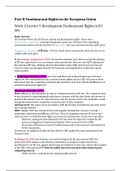Samenvatting
Samenvatting Part 2 van Fundamental Rights in Europe (CoE/ ECHR)
- Instelling
- Vrije Universiteit Amsterdam (VU)
Hiermee heb ik een 8,6 gehaald! Volledige samenvatting, met de stappenplannen, aantekeningen van alle hoorcolleges en werkgroepen. Alle voorgeschreven stof van het boek en extra artikelen is erin samengevat. Tekst is voornamelijk Engels, maar lastige termen/ delen zijn vertaald in Nederlands. Duide...
[Meer zien]





